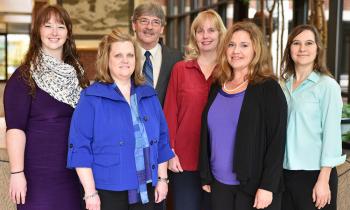Faculty Fellows Announced for 2015-16
February 5, 2016 | | Faculty Spotlight, Press Release

Chattanooga, TN (February 5, 2016) --- Chattanooga State employs a talented and passionate team of faculty. The Chattanooga State Faculty Fellows program, made possible with financial support by donors to the Chattanooga State Foundation, highlights faculty excellence across campus while honoring former faculty who demonstrated scholarship and passion for teaching and learning.
Proposals to become a Fellow were reviewed and selected by the respective deans. The following faculty members were named as 2015-16 Fellows:
The Richard K. Lamerand Engineering Technology Fellow: Jacqueline Smith proposed to enrich and maintain high quality in the Associate of Applied Science General Engineering degree program through the development of a comprehensive lab manual for ENGR-1130 Basic Engineering Science Lab. “A comprehensive lab manual will allow for a smoother course delivery and students will benefit by gaining access to all pre-lab assignments and lab procedures in one document,” shares Ms. Smith.
The Dr. Gladys Crates Mathematics & Sciences Fellow: Libby Farrelly says that during 2013-2014, the Life Sciences Biology faculty created two tracks that separated science majors from non-science majors resulting in a non-majors Biology course (BIOL-1010/1020) and a majors Biology course (BIOL- 1110/1120). “This positive change better serves both majors and non-major students in meeting their academic goals. The approach has been successful in engaging students and interest has increased since the course was first taught,” states Ms. Farrelly.
The Bea Lyons Social & Behavioral Sciences Fellow: Dr. Lindsay Holland says that the use of High Impact Practices in this experiential learning assignment will be designed for use in PSYC-2120 Social Psychology to promote learning of social psychological concepts while simultaneously providing information and informal support to first year students in the newly designed College Success Course. “The Experiential Learning Assignment will be comprised of four parts: 1. defining relevant terms, 2. composing a self-reflection piece on “self”, 3. group presentation to CSSB-1000; and 4. composing a self-reflection piece on group processes,” explains Dr. Holland.
The Hugh Vines Tennessee College of Applied Technology Fellow: Jimmy Jones explains that while working on the Assessment Plans that faculty from the Tennessee College of Applied Technology {TCAT) are required to submit for the SACS report, he became aware that TCAT faculty would benefit greatly from direct guidance and assistance in identifying and articulating the various types of assessments that may be used to measure the Program Student Learning Outcomes {PSLO's). “By having someone who teaches in the division as an on-site resource to help identify current assessments, provides evidence to support the assessments and develop new ones, will strengthen the entire division's teaching and learning efforts,” says Mr. Jones.
The Amanda Wynn Humanities & Fine Arts Fellow: Dr. Jennifer Arbogast says her project will focus on High Impact Practices and Interdisciplinary involvement through a study on student engagement in the arts. “The core of my project would be to research why students are or are not choosing to engage in the arts on campus, to inform students of the many artistic opportunities available to students on our campus, regardless of major, and to use this information to recruit students of all majors to be involved in Fine Arts opportunities on campus, to enrich the experience they are already having in their respective majors,” shares Dr. Arbogast.
The Dr. Howard Yarbrough Nursing & Allied Health Fellow: Dr. Lisa Legg wants to promote and develop new faculty who are engaged and committed to student success. “By continuously reviewing and revising individualized learning opportunities, students will gain knowledge and experience in potential healthcare professions through high-impact learning practices. Then, designing a service-learning course, which involves students in a high-impact practice, will encourage engagement and promote motivation to succeed,” illustrates Dr. Legg.
The Faculty Fellowship program forms a community of learning to engage in high impact scholarship. With an annual investment of approximately $20,000 supported by the Chattanooga State Foundation, Fellows will each receive $2,500 plus benefits, and each will serve as a mentor for future faculty scholars.
For more information about the Faculty Fellows program, visit the Faculty Center for Excellence and Innovation at https://www.chattanoogastate.edu/academics/initiatives/faculty-center.
